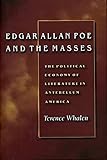Edgar Allan Poe and the Masses : The Political Economy of Literature in Antebellum America / Terence Whalen.
Material type: TextPublisher: Princeton, NJ : Princeton University Press, [2021]Copyright date: ©1999Description: 1 online resource (392 p.) : 4 line illusContent type:
TextPublisher: Princeton, NJ : Princeton University Press, [2021]Copyright date: ©1999Description: 1 online resource (392 p.) : 4 line illusContent type: - 9781400823017
- Authors and readers -- United States -- History -- 19th century
- Authorship -- Economic aspects -- United States -- History -- 19th century
- Capitalism and literature -- United States -- History -- 19th century
- Economics and literature -- United States -- History -- 19th century
- Literature publishing -- United States -- History -- 19th century
- Politics and literature -- United States -- History -- 19th century
- Popular literature -- United States -- History and criticism
- LITERARY CRITICISM / American / General
- 818/.309
- PS2633 ǂb W48 1999eb
- online - DeGruyter
| Item type | Current library | Call number | URL | Status | Notes | Barcode | |
|---|---|---|---|---|---|---|---|
 eBook
eBook
|
Biblioteca "Angelicum" Pont. Univ. S.Tommaso d'Aquino Nuvola online | online - DeGruyter (Browse shelf(Opens below)) | Online access | Not for loan (Accesso limitato) | Accesso per gli utenti autorizzati / Access for authorized users | (dgr)9781400823017 |
Browsing Biblioteca "Angelicum" Pont. Univ. S.Tommaso d'Aquino shelves, Shelving location: Nuvola online Close shelf browser (Hides shelf browser)

|

|

|

|

|

|

|
||
| online - DeGruyter Taking the Constitution Away from the Courts / | online - DeGruyter Ballots and Bullets : The Elusive Democratic Peace / | online - DeGruyter Environment, Scarcity, and Violence / | online - DeGruyter Edgar Allan Poe and the Masses : The Political Economy of Literature in Antebellum America / | online - DeGruyter Authorizing Experience : Refigurations of the Body Politic in Seventeenth-Century New England Writing / | online - DeGruyter Out of Place : Englishness, Empire, and the Locations of Identity / | online - DeGruyter Landscapes of Loss : The National Past in Postwar French Cinema / |
Frontmatter -- CONTENTS -- PREFACE -- LIST OF ABBREVIATIONS -- PART ONE CAPITALISM AND LITERATURE -- Chapter One INTRODUCTION: MINOR WRITING AND THE CAPITAL READER -- Chapter Two THE HORRID LAWS OF POLITICAL ECONOMY -- Chapter Three FABLES OF CIRCULATION: FOE'S INFLUENCE ON THE MESSENGER -- Chapter Four POE AND THE MASSES -- PART TWO RACE AND REGION -- Chapter Five AVERAGE RACISM: POE, SLAVERY, AND THE WAGES OF LITERARY NATIONALISM -- Chapter Six SUBTLE BARBARIANS: THE SOUTHERN VOYAGE OF EDGAR ALLAN POE -- PART THREE MASS CULTURE -- Chapter Seven THE CODE FOR GOLD: POE AND CRYPTOGRAPHY -- Chapter Eight CULTURE OF SURFACES -- Chapter Nine THE INVESTIGATING ANGEL: POE, BABBAGE, AND "THE POWER OF WORDS" -- NOTES -- INDEX
restricted access online access with authorization star
http://purl.org/coar/access_right/c_16ec
Edgar Allan Poe has long been viewed as an artist who was hopelessly out of step with his time. But as Terence Whalen shows, America's most celebrated romantic outcast was in many ways the nation's most representative commercial writer. Whalen explores the antebellum literary environment in which Poe worked, an environment marked by economic conflict, political strife, and widespread foreboding over the rise of a mass audience. The book shows that the publishing industry, far from being a passive backdrop to writing, threatened to dominate all aspects of literary creation. Faced with financial hardship, Poe desperately sought to escape what he called "the magazine prison-house" and "the horrid laws of political economy." By placing Poe firmly in economic context, Whalen unfolds a new account of the relationship between literature and capitalism in an age of momentous social change.The book combines pathbreaking historical research with innovative literary theory. It includes the first fully-documented account of Poe's response to American slavery and the first exposé of his plot to falsify circulation figures. Whalen also provides a new explanation of Poe's ambivalence toward nationalism and exploration, a detailed inquiry into the conflict between cryptography and common knowledge, and a general theory of Poe's experiments with new literary forms such as the detective story. Finally, Whalen shows how these experiments are directly linked to the dawn of the information age. This book redefines Poe's place in American literature and casts new light on the emergence of a national culture before the Civil War.
Mode of access: Internet via World Wide Web.
In English.
Description based on online resource; title from PDF title page (publisher's Web site, viewed 29. Nov 2021)


